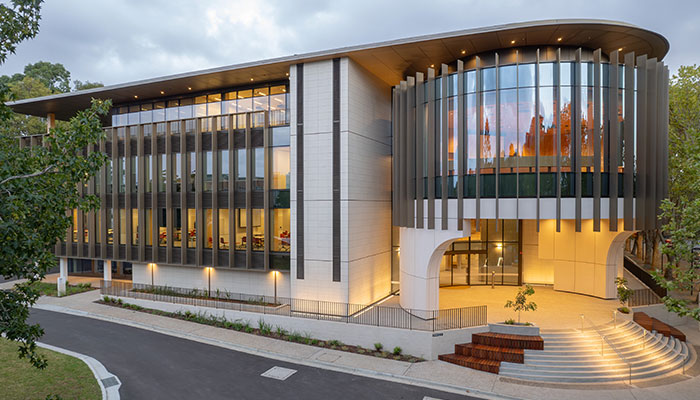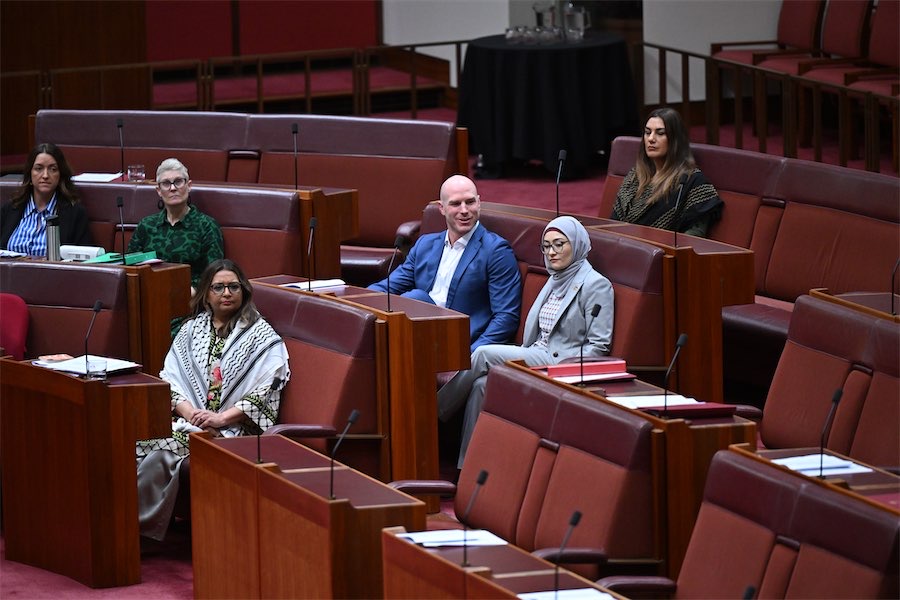
Legal columnist HUGH SELBY says the nub of the problem with indigenisation is that in the Australian legal system that governs us all, it lacks the substance and the relevance to be given the role of “significant”. This is not to deny that it is an important, and enduring subject of interest for those committed to maintaining indigenous culture.
Is it possible to agree on what needs to be taught to the next generation?

There’s a timely debate afoot about the content of Australian law school curricula, what it is and what it should be.
This debate is being “run” by The Australian, kicked off by recent attention to delivery of a “Welcome to Country” being an assessment exercise at Macquarie University’s law school.
The broader issue of what should be in and out of subjects (both core and elective) in a law degree has now extended, thanks to The Australian stirring of the hornets’ nest, to the law schools of Monash, UNSW, and Melbourne. Doubtless it will reach other law schools too.
Among The Australian’s recent articles are two that stand out: one by Janet Albrechtsen (here) the other by Henry Ergas (here).
They stand out because of the clarity of their writing, the seeming persuasiveness of their arguments, and their timeliness.
Here’s a partial summary of these two articles, but I’d prefer you read them to understand their tone (that being an important aspect that I cannot summarise).
Mr Ergas made these points in an article that drew from classical reasoning, and insights from leading 20th century (up to 1972) American legal thinkers:
- It is quite proper to criticise academic conduct that “politicises law courses”;
- A defence to that criticism that creates an imaginary opponent is easily recognised as avoiding the issue;
- The real issue (from recent articles about law at Macquarie University) is whether it is okay to “grade law students on the enthusiasm with which they deliver a ‘welcome to country’”;
- To grade students on such an exercise is “no less a form of indoctrination than would be assessing them on their fervour in reciting the Lord’s Prayer”;
- To explore the social context and impact of the legal system is commendable;
- However, when teaching becomes preaching all is lost;
- There are important statements by American law academics and judges from early 20th century through to the early 1970’s that emphasise “open mindedness and critical inquiry” as prerequisite to “enlightened and effective public opinion”;
- If universities (and their law schools) abandon impartiality and objectivity then fanaticism, not community, is spawned; and,
- That is where, sadly, we are now.
Mr Ergas and I are in furious agreement on his italicised exploration, preaching, and community points.
Ms Albrechtsen made these points in her article that employs her trademark, that is the sharpness of the blade that she uses to slice and dice messages and messengers that she scorns.
It is wonderful to read unless it is you who is being cut to pieces, all the while wondering why some facts important to you have been overlooked by this modern-day Boadicea fighting for “traditional” values.
- What is being done to “indigenise” the law school curriculum?
- Is this “education” or is it “politicising”?
- What are we to make of this injecting “indigenous law” into “settler law” approach to legal education?
- What are we to make of trying to give certainty to an unwritten plethora of indigenous custom versus the relative specificity of the “settler law” brought by the colonisers and since developed in our courts and parliaments?
- The notion of “indigenous sovereignty” is only a political construct. It does not exist within the legal system of this nation.
- Therefore, it is important to decide how, when and where “indigenous law” is to be reflected in a law school curriculum. There can be no cavilling with an elective that focuses on what is known of “indigenous law and custom” and how it relates to our nation’s law.
- Likewise, it is appropriate that core subjects address how our law affects indigenous people. Ms Albrechtsen gives examples, such as Mabo and native title in a property course, circle sentencing and specialist indigenous courts in a sentencing course, and cultural factors that are important for child welfare. I would add within consumer protection the awful history of exploitation of indigenous communities covering, for example, encyclopedia, insurance, and mobile phone plans.
- Recognising the inevitability of “bias” (conscious or unconscious) in all scholarship, it is essential that these biases are recognised and examined, lest scholarship is debased.
- The leaders of the law schools that have embarked on “indigenisation” need to defend their chosen path with substantive argument, not motherhood statements that are “fluff and dross”.
Ms Albrechtsen and I are in furious agreement that, “assessing a student’s delivery of an acknowledgment of country… is clearly bonkers”. (I contacted the academic who runs that course to seek clarification. There was no response.)
I suspect, based on her writing, that Ms Albrechtsen and I would agree that composing a “Welcome to Country” that accurately reflected the legal position in this nation could be a worthwhile exercise.
I found myself almost in agreement with the tone of her article (hence my suggestion that you read it) until I turned my attention back to some overlooked issues.
Broader issues need attention
Let’s consider some unmentioned issues in the interests of further discussion (which is necessary) being more nuanced, broad based and focused upon what we should, as distinct from should not, be doing with law curricula at this quarter century mark.
Any claim that the teaching of traditional law subjects (such as, to pick out a random few, Constitutional, Criminal, Contract, Property, Corporate, Taxation, Torts, Wills and Estates) is “neutral” when it is taught purely from the perspective of decided appellate cases and legislation is false.
It is false because all law is created within the social, economic and cultural context of its time and place. One example is the centuries-long acceptance of slavery within English and American law. Another example is the enduring prevalence of the death penalty within many, but not all, legal systems.
Because of this link between the law and the everyday world it is impossible to properly understand the law, or to apply it, without some insight into how it came to be, and what sustains it today.
For example, mandatory sentencing for particular offences is a politically driven, indefensible response to short-term surges in some criminal offences.
We saw it most recently when Prime Minister Anthony Albanese eschewed good advice and common sense and opted for political damage control to guide his government’s response to an alleged uptake in antisemitic messaging. His government didn’t even have the sense to give their responses a time limit: eg, that the sentencing requirements would expire in two years.
By leaving it open-ended it is inevitable that future sentencing judicial officers will be bound to impose sentences that do not reflect the information before them, be that the objective seriousness of an offence or the subjective aspects of the offender.
If we treat “sentencing” as a topic within a criminal procedure course, it would be a serious oversight to fail to address the research and policy issues that arise when mandatory sentencing is considered by a parliament.
Several questions then arise, the first of which is what research, and what policy issues are to be included?
If criminal procedure is a one-semester course, then there has to be selection of which, among many possible topics, is to be included. Sentencing is only one topic. Is it to take up 10 per cent, 20 per cent, a larger per cent of the course time? Mandatory sentencing, while newsworthy and an important policy issue, is a minnow issue in all the problems of sentencing to which students might be introduced.
Given that close to 90 per cent of all criminal matters lead to pleas of guilty and hence to a sentencing hearing, there’s an argument that, as a matter of practicality, an introductory criminal procedure course taken by law students could address bail law, sentencing law, parole and not much else. These are matters that excite an ignorant mainstream media which reports them through that filter of ignorance. To have all law students better informed is a counterbalance.
However, those law students who don’t go on to practice in criminal law (which is most of them) can hardly be said to need to know about, for example, which offences can and cannot be dealt with in the Magistrates Court, what are the formal requirements for an indictment that sets out the charges being taken to a higher court, when co-defendants should have separate trials, what is required of each side by way of pre-trial disclosure, how to treat sensitive evidence, the law relating to the issue and use of warrants to enter, search and seize, etcetera.
These observations simply illustrate that any approach to law school curricula that reflects a bygone age of few statutes, little regulation, and having to reference only printed decisions chosen by the judges to be in “authorised report” collections, is well past its use by date.
That is why the law curricula are not static. They are evolving in response to our changing community.
Law curricula is always evolving
In 1968 my first law subject was “Legal History”. It did not reflect the inspired thinking of American jurists to whom Henry Ergas refers. I don’t recall it going outside what had happened in England since medieval times. I am sure there was no mention of the British imposing their law on this country in 1788, as they could because they were conquerors.
I am sure too that there was no mention of the poor treatment of women under the law (there were few women in the class). We didn’t touch on how our law treated non-heterosexual sex. We didn’t have to because that activity, for males, was criminalised.
There were two compulsory “Constitutional Law” subjects. Each ran for a full academic year. In neither was there a mention of Aborigines, despite the Australian Constitution making specific mention, and the West Australian State Constitution originally containing measures for their advancement which were later removed. Nor was there mention of voting rights for women or prisoners.
Likewise, employment law made no mention of the 1966 Wave Hill walkoff by 200 Gurindji stockmen, house servants and their families. That “industrial” dispute continued throughout my years at law school, entirely unremarked, save by a handful who took the “way outside the box” new elective, Law and Social Justice.
There was no course dealing with adoptions, the state taking away children from their families, the legal issues faced by the mentally ill and their families, or the legal issues for elderly people moving from independence into increasingly dependent care.
The important observation that comes from looking backwards is that whatever criticisms are to be made today of the current fervour for “recognition” of all things indigenous, there has been worthwhile, steady progress in the breadth of proper content within law curricula.
The future relies on not being distracted by the obsession of a few
That steady progress far outweighs the possibility of lasting “damage” being caused to young, intelligent adult minds by a “bonkers” sideshow of force-fed “indigenisation”.
Which is not to say that The Australian was wrong to wring as much political capital from it as it could. Rather it is to say that debating the totality of what we teach, why and how, is much more important than repeated derision about a comical sideshow being played out in two or more law schools.
It’s noteworthy that between 3 per cent and 4 per cent of the Australian population are indigenous or Torres Strait Islander. Between 3 per cent and 4 per cent of us identify as Muslim, and 4.5 per cent identify as LGBTIQ+.
There’s no popular movement to refocus Australian legal studies from either a Muslim or a LGBTIQ+ perspective; however, if indigenisation (as described in the recent Australian articles) is valid, then these groups too have proper claims.
Except that they don’t have, do they?
And therein lies the nub of the problem with indigenisation – in the Australian legal system that governs us all it lacks the substance and the relevance to be given the role of “significant”. This is not to deny that it is an important, and enduring subject of interest for those committed to maintaining indigenous culture.
In 1968 it was a great leap forward in NSW to require would-be lawyers to do combined degrees, where humanities or science were studied before the intensive core law subjects, which were intended for practising lawyers: that is, those “black letter” subjects where principles trumped theory in everything except jurisprudence, which is the study of the theory or philosophy of law.
In 2025 our law curricula need to take account of all aspects of our multicultural, digital age as these apply to every person in Australia. These are recent demands, and all must be recognised, prioritised, and accommodated to some degree. Principles and various theories must co-exist.
Henry and Janet did us all a service by drawing attention to the need to ensure that our law courses combine the rigour of understanding legal principles with the tools to assess the strengths and limitations of our laws, and the capacity to recognise when singular interests are “stealing” from the many other interests that deserve attention.
That acknowledgement made, they did their readers a disservice by painting a picture of troubles that didn’t also illuminate the inspired choices about what to teach and how to teach it that are being made by good law teachers around Australia all the time.
Hugh Selby, a former barrister, is the CityNews legal columnist.
Who can be trusted?
In a world of spin and confusion, there’s never been a more important time to support independent journalism in Canberra.
If you trust our work online and want to enforce the power of independent voices, I invite you to make a small contribution.
Every dollar of support is invested back into our journalism to help keep citynews.com.au strong and free.
Thank you,
Ian Meikle, editor









Leave a Reply